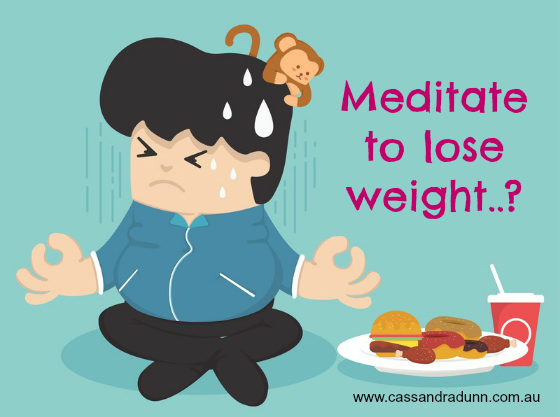
Meditation has long since dropped its reputation as a weird hippy past-time and firmly established its place in the mainstream as a foundation for optimal physical and mental health. There is research demonstrating that the benefits of mindfulness meditation include, but are not limited to:
- Lowering blood pressure
- Boosting immunity
- Slowing the signs of ageing
- Reducing depression, stress and anxiety
- Enhancing relationships
Improving attention, memory and focus
The list is long and perhaps you’ve already heard people espousing the many benefits of maintaining a meditation practice. What you may not have heard is that some of those benefits can directly and indirectly support your efforts to lose weight and create a healthier lifestyle.
See, this is where people become interested because for all the talk about accepting ourselves and loving our bodies, most women are still quite preoccupied with weight and body shape. If trimming down and toning up is a priority for you, below are three very specific ways that incorporating a bit more mindfulness into your day might help you to more quickly shed that excess weight:
1. Reducing stress
Stress causes your body to produce cortisol. A little cortisol is normal and healthy but when you’re continually stressed, you can have an over-production of cortisol. There are lots of negative consequences to that and one of them is that it stimulates overeating (particularly high fat and high sugar foods) and also causes your body to hold onto fat. We know that being stressed also impacts the quality of your sleep. Sleep deprivation messes with the hormones leptin and ghrelin, which are known as the hunger hormones because they regulate your feelings of hunger and fullness.
So in a nutshell, if you’re chronically stressed you’re more likely to crave junk food, eat more of it, and store fat. That’s a triple whammy when it comes to weight gain and we haven’t even touched on the psychological aspect of emotional eating which is a hindrance to weight loss. Practising mindfulness meditation has been proven to reduce stress and improve sleep so from a purely physiological perspective, it’s well worth devoting time each day to maintaining a meditation practice.
2. Curbing unhealthy habits
Mindfulness involves bringing your full awareness to what’s happening as it’s happening (without judgement). Most of us move about our days on autopilot, and our thoughts and behaviours are very habitual. If you think about it, how often do you reach for a snack, finish a whole bag of chips or stand staring into the fridge without even consciously thinking about what you’re doing? Anything can be a trigger for this kind of automatic eating, e.g., the time of day, feeling bored, or another (linked) habitual activity like watching TV.
By developing an increased capacity for mindfulness, you bring yourself into the present and realise what you’re doing. When you’re actually aware of what you’re doing, you realise you have a great number of other options available to you! You also learn to know what your triggers are for mindless, compulsive or emotional eating and you’re more able to catch yourself before you fall into those old bad habits.
3. Learning to tolerate discomfort
Stress and boredom can certainly be triggers for emotional eating and sometimes a little awareness can be enough to help you curb that behaviour. But sometimes your difficult emotions can be a lot more intense than a few moments of frustration, and in those situations sometimes you don’t care about what you’re eating because your main goal is to take away the pain you’re feeling. We all have various strategies we use to avoid, suppress or numb emotional pain and food is definitely one of those strategies for many people.
Practising mindfulness meditation, contrary to popular stereotypes, is not about emptying your mind or taking yourself off to a happy place where you can take a lovely break from your real life. Mindfulness is about showing up and being fully present to what is happening, without needing your situation or your feelings to be any different from what they are. By developing the capacity to sit with your discomfort rather than run away from it, you’re far less likely to use food (or alcohol or shopping) as avoidance. This is one of the most powerful benefits of a meditation practice. If you know you use food to suppress your emotions, I highly recommend you explore how mindfulness can help you break that pattern.
Where to start?
If you’re interested in exploring meditation, there are a lot of free apps you can download that include guided meditations. But if you’re serious about learning mindfulness properly, I’d love you to join my online course, Mindfulness for Busy People. It’s an 8-week program based on the world renowned Mindfulness Based Cognitive Therapy and teaches you step by step how to build mindfulness into your daily life.
Hundreds of people have benefited from the program and you can get on the waitlist to be first to hear when doors are open again (plus get in on any special earlybird offers!)







[…] is the very definition of suffering. You might not like it, but sometimes your best option is to drop the struggle and let it be. It’s not defeat – it’s a wise redirection of your time and […]